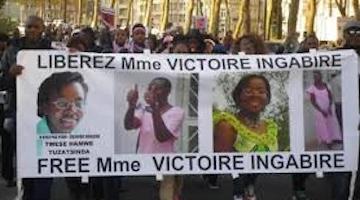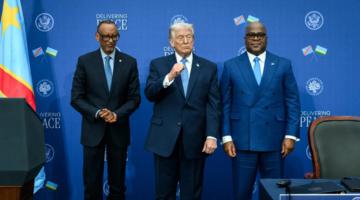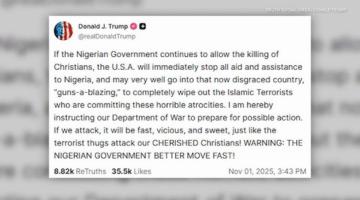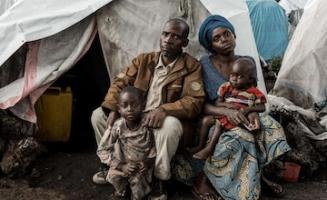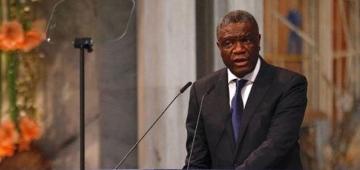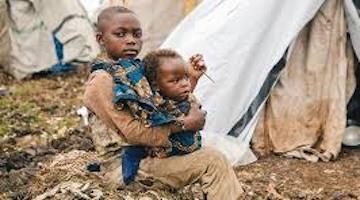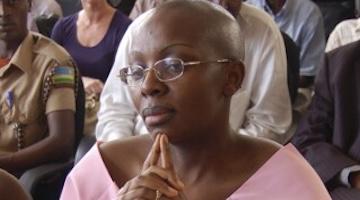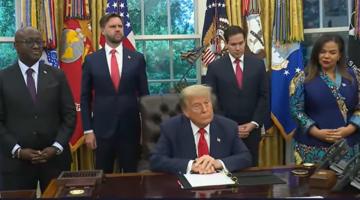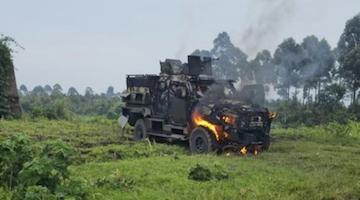In 2014, Rwandan gospel singer Kizito Mihigo recorded Igisobanuro Cy'urupfu, in which he sang of lives that had been "brutally taken but not called genocide," meaning Hutu lives.
Kizito Mihigo and Victoire Ingabire both challenged Rwanda's foundational genocide narrative. He died in jail, and she is now in custody.
On June 19, Rwandan opposition leader Victoire Ingabire was once again arrested in Rwanda. She and gospel singer Kizito Mihigo were both released from Rwanda’s Nyarugenge Prison in September 2018, after she had served eight years, he four. Both were ordered not to move beyond the borders of Rwanda, where their message about the true history of the Rwandan Genocide and the nature of the Rwandan regime might find a greater audience.
Nearly two years later, on February 13, 2020, Kizito tried to escape into neighboring Burundi. Rwandan police apprehended him at the border and then reported that he had been found dead in a jail cell four days later, on February 17, 2020. Police claimed that he had hung himself, but it’s preposterous to think that Kizito was not under guard for a moment. Rwanda’s apparatus of surveillance, repression, and punishment is among the world’s most draconian.
The autopsy report was not released, and Human Rights Watch’s call for a transparent investigation and independent autopsy was ignored.
Where is Victoire?
As of June 24, Victoire Ingabire’s location is not known, and her supporters fear most of all for her safety. In 2010, when she left exile in the Netherlands to return to Rwanda, she told supporters that if she were assassinated, they would have to pick up the struggle where she left off.
In 2024, in the documentary “How the NBA got into business with an African dictator,” she told an ESPN reporter, “If they put me in prison, I will be imprisoned. If they assassinate me, I will be assassinated, but I have to continue my struggle.”
Victoire is arguably in a stronger position than Kizito was. His dissidence was not unknown outside Rwanda, but hers is better known. Both of their arrests were reported outside Rwanda, and both were championed by Human Rights Watch and Amnesty International, but her story was more widely reported, and she has since found voice in Al Jazeera, The Guardian, The Elephant, and African Arguments. Her re-arrest last week has been reported by France24, NTVKenya, Reuters, Radio France International, Modern Ghana, Associated Press, Yahoo News, the Washington Post, and many lesser-known news outlets.
She does not, however, have the high profile that ultimately forced Kagame to release Paul Rusesabagina, whose story was dramatized in the movie Hotel Rwanda, and Kagame has demonstrated time and time again that he is willing to order the assassination of his political opponents.
Kayumba Nyamwasa, his former defense and intelligence chief, has told the BBC and other outlets that Kagame ordered the assassination of former Rwandan President Juvenal Habyarimana, triggering the 90 days of massacres that ended the four-year Rwandan Civil War and left Kagame in power. “I was in a position to know,” he told the BBC.
Kayumba himself survived three assassination attempts between 2010 and 2016 in South Africa, where he lives in exile. He has described Kagame as “having the mind of a serial killer” who “needs to see the body and smell the blood.”
Patrick Karegeya, Kagame’s former intelligence chief, was strangled to death on New Year’s Eve in 2013, his body found in a Johannesburg hotel on New Year’s Day 2014.
In 2011, the BBC reported that UK police visited two Rwandan exiles living in London to warn them that they faced the threat of assassination by a hitman sent by the Rwandan government.
In her book In Praise of Blood: Crimes of the Rwandan Patriotic Front, Canadian journalist and author Judi Rever recounts how Belgian secret servicemen appeared at her side while she was checking into a Brussels hotel on a research trip. They told her that Rwandan operatives were in the country to kill her and that they, the Belgian secret servicemen, would be by her side for the remainder of her trip to make sure that didn’t happen.
Rever also recounts how, when she was back in Canada finishing the book, Rwandan operatives would call her home, even threatening her children, until she finally collapsed with an autoimmune disease, but finished the book nevertheless.
In 2023, Human Rights Watch published “‘Join Us or Die’: Rwanda’s Extraterritorial Repression.”
The list of threats and assassinations beyond Rwanda’s borders is long, the list of those within Rwanda even longer. In her 2024 interview with ESPN, Victoire Ingabire recounted the list of her assistants and colleagues who have died or disappeared since her return from exile in 2010.
The list of journalists dead or in exile is long as well. After spending a year trying to teach journalism in Rwanda, Anjam Sundaram reported the peril journalists face in Bad News: Last Journalists in a Dictatorship.
Why is Victoire detained now?
Last week, Victoire was summoned to a Rwandan court to testify in the case of eight political dissidents on trial for organizing resistance to the Rwandan government and possessing Blueprint for Revolution, a book of techniques for carrying out nonviolent political protest, and one journalist on trial for reporting on their efforts. All nine defendants were in pretrial detention for three years, between 2021 and 2024, before finally going on trial in December of last year.
After her court appearance, Victoire was arrested and accused of leading and conspiring with the defendants. As their case demonstrates, the very act of dissent—any dissent—is a crime in Rwanda. Simply possessing a book on nonviolent political protest is a crime. This is a country where President Kagame routinely wins “elections” by 90+ percent, most recently, in 2024, by 99.18%.
Two weeks before Victoire’s arrest, Al Jazeera published her op-ed, "The Rwanda-DRC peace deal must include the voices of the voiceless," in which she dared to call for dialogue that could lead to prosperous regional integration.
Victoire and Kizito’s challenge to the official Rwandan Genocide narrative
Victoire poses a profound challenge to the Kagame regime, not only to its repressive, anti-democratic extremes, but also to its founding narrative, as did Kizito Mihigo.
Kizito was a Rwandan gospel singer, songwriter, organist, and composer born in 1981. His talent emerged early, and as a teenager he became the most celebrated liturgical organist and composer within Rwanda’s Catholic Church.
A Tutsi, he survived the 1994 genocide, which claimed his father’s life and orphaned him at 13. Fleeing to Burundi, he briefly attempted to join Paul Kagame’s Rwandan Patriotic Army (RPA), which was waging the four-year war that ended in the genocide.
After the war and genocide, he became a celebrated advocate for reconciliation in Rwanda, but in time he embraced a more complex history than the official “genocide against the Tutsi” narrative of demon Hutus massacring innocent Tutsis. He came to realize that Hutus had also died violently, had also been victims. Several months before his 2014 arrest, he recorded the gospel song, which sealed his fate, Igisobanuro Cy'urupfu, in English “The Meaning of Death.” He recounted what happened next, leading to his arrest, in his 2016 statement from prison.
In Igisobanuro Cy'urupfu, Kizito sang (in English translation):
“Even though genocide orphaned me
Let it not make me lose empathy for others
Their lives too were brutally taken
But not qualified as genocide
Those brothers and sisters
They too are humans, I pray for them
Those brothers and sisters
They too are humans, I comfort them
Those brothers and sisters
They too are humans, I remember them”
That was Kizito’s great sin, the one he died for, acknowledging and commemorating the Hutu lives that were also brutally taken, “but not qualified as genocide.” In Rwanda, “the genocide against the Tutsi” is the legally codified and enforced description of the 1994 genocide.
In 2010, Victoire returned from exile and also called for commemoration of the Hutu. She attempted to run for president against Paul Kagame, but instead she was handed a 15-year prison sentence for allegedly minimizing the Rwandan Genocide and organizing armed resistance to the government, though she denied both charges.
The accusation that she had minimized the Rwandan Genocide stemmed from her appearance at Kigali’s genocide memorial, where she asked where the memorial to the Hutus was.
During that year, while attempting to run for president, she said that Hutu people were also killed before, during, and after the genocide, often in what were crimes against humanity, not only in Rwanda but also in the ensuing bloodbaths in the Democratic Republic of the Congo.
That was Victoire’s greatest crime against the regime. For that, she is accused of genocide denial, divisionism, revisionism, and “genocide ideology.” In Kagame’s Rwanda, it is genocidal to say that Hutus also died and call for them to be commemorated too.
Why? Because this is the foundational narrative of Kagame’s Rwanda. The world accepts his right to rule, no matter how repressive, and lauds his leadership because, according to this foundational narrative, he is the Tutsi general who stopped the genocide against the Tutsi. He stopped the demon Hutu butchers.
For the past 30 years, Kagame has waged war for territory and mineral wealth in the Democratic Republic of the Congo, saying all the while that he is pursuing Hutu genocidaires now organized in the refugee Democratic Federation for the Liberation of Rwanda (FDLR). When challenged about the millions of Congolese who have died or about the vast wealth his militias have stolen, he and his spokesmen scream, “FDLR!!! Genocide denial!!! Genocide against the Tutsi!!!” As in Rwanda, anyone who attempts to tell a more complex story is accused of genocide denial.
Take away that foundational narrative and it’s over. The Kagame regime loses its legitimacy in both Rwanda and Congo.
Kizito died for challenging that narrative. The world must not allow Victoire to die for the same “crime.”
Ann Garrison is a Black Agenda Report Contributing Editor based in the San Francisco Bay Area. In 2014, she received the Victoire Ingabire Umuhoza Democracy and Peace Prize for her reporting on conflict in the African Great Lakes region. She can be reached at ann@anngarrison.com. You can help support her work on Patreon.

